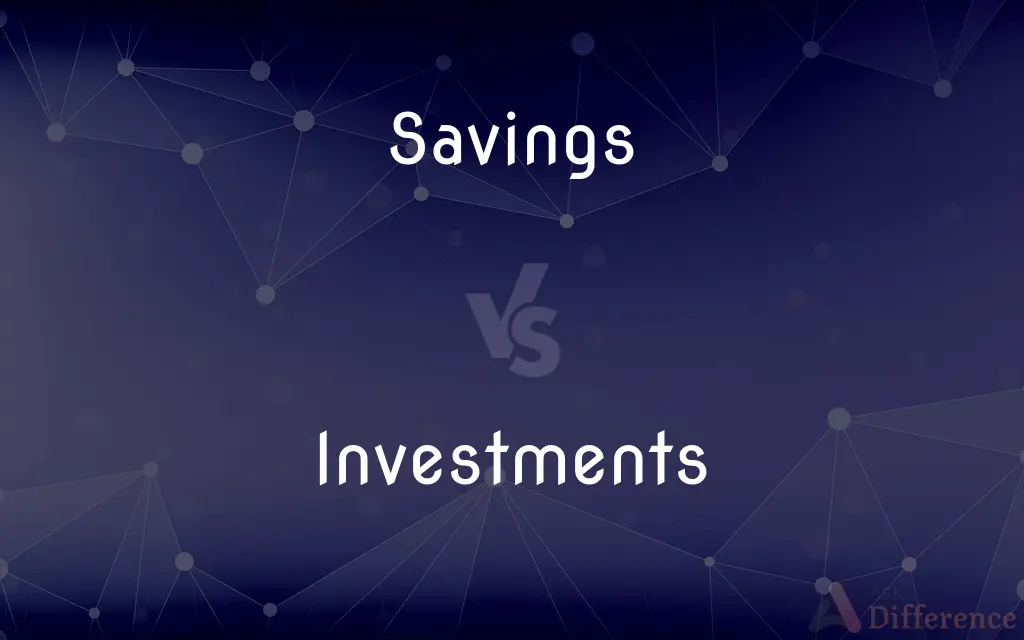Savings vs. Investments — What's the Difference?
By Tayyaba Rehman & Fiza Rafique — Published on September 20, 2023
Savings are funds set aside for future use or emergencies, often earning minimal interest. Investments are assets purchased with the expectation of generating a return over time.

Difference Between Savings and Investments
Table of Contents
ADVERTISEMENT
Key Differences
Savings refer to the act of setting aside money for future use, typically in a savings account, where the growth is usually minimal but relatively secure. Investments, on the other hand, involve purchasing assets like stocks, bonds, or real estate with the expectation of a financial return. The level of risk in investments is generally higher than in savings, but so is the potential for reward.
When people talk about savings, they often mean a safe, liquid form of holding money. This money can be quickly accessed for emergencies or opportunities and typically earns interest at a modest rate. Investments involve higher risk and potentially higher returns, but they are generally not as liquid as savings. You can't easily withdraw your investments without selling the asset, which could result in a loss.
Savings are primarily meant for financial security and are often encouraged as a habit from a young age. Financial advisors usually recommend keeping at least three to six months' worth of expenses in a savings account for emergencies. Investments are more aligned with financial growth, where the objective is to increase wealth over time through capital gains, dividends, or interest.
In summary, savings are low-risk, liquid assets intended for financial safety and short-term needs. Investments are riskier assets acquired for the purpose of generating wealth over a more extended period. Both are essential components of a balanced financial portfolio but serve different purposes and come with different levels of risk and return.
Comparison Chart
Purpose
Financial security
Financial growth
ADVERTISEMENT
Risk
Low
Varies (often higher)
Liquidity
High
Low to medium
Growth
Minimal
Potential for high growth
Accessibility
Easy and quick
May require time/market
Compare with Definitions
Savings
Funds Set Aside: "Savings are funds set aside for future use or emergencies."
I have $5,000 in savings for unexpected expenses.
Investments
Return Expectation: "Investments are assets bought with the expectation of financial return."
My stock investments have doubled in value.
Savings
Short-Term: "Savings are often intended for short-term financial needs."
I keep savings for immediate opportunities or emergencies.
Investments
Risk Involvement: "Investments often involve a varying degree of financial risk."
Some of my investments are high-risk but high-reward.
Savings
Low Risk: "Savings typically involve low financial risk."
My savings account has a guaranteed interest rate.
Investments
Long-Term: "Investments are usually intended for long-term financial growth."
I plan to hold my investments for at least 10 years.
Savings
Liquid Assets: "Savings are highly liquid, easily accessible assets."
I can withdraw my savings anytime I need.
Investments
Capital Growth: "Investments aim for capital growth, dividends, or interest."
My investments yield an annual return of 7%.
Savings
Interest Earning: "Savings usually earn interest, though typically at a low rate."
The interest from my savings helps it grow slowly.
Investments
Illiquid Assets: "Investments are generally less liquid than savings."
It's not easy to quickly cash out my real estate investments.
Savings
Rescue from harm, danger, or loss.
Investments
The act of investing.
Savings
Avoidance of excess expenditure; economy.
Investments
An amount invested.
Savings
A reduction in expenditure or cost.
Investments
Property or another possession acquired for future financial return or benefit.
Savings
Something saved.
Investments
A commitment, as of time or support.
Savings
Savings Money saved
A bank account for savings.
Investments
A military siege.
Savings
Savings (used with a sing. verb) Usage Problem An amount of money saved
A rebate that yielded a savings of $50.
Investments
Investiture.
Savings
(Law) An exception or reservation.
Investments
A garment; a vestment.
Savings
With the exception of.
Investments
An outer covering or layer.
Savings
Except; save.
Investments
Plural of investment
Savings
Plural of saving
Savings
A fund of money put by as a reserve
Common Curiosities
How Liquid are Savings?
Savings are highly liquid and easily accessible.
Are Savings Risky?
Savings are generally low-risk but offer minimal growth.
What are Savings?
Savings are funds set aside for future use or emergencies.
Do Savings Earn Interest?
Yes, savings usually earn interest, albeit at a low rate.
How Much Should I Save?
A common recommendation is to save at least three to six months' worth of expenses.
Are Investments Risky?
Investments vary in risk and can offer high returns or result in losses.
What is the Purpose of Savings?
The primary purpose of savings is financial security.
What are Investments?
Investments are assets bought with the expectation of generating a return.
What is the Purpose of Investments?
Investments aim for financial growth over the long term.
Can Savings Become Investments?
Yes, savings can be used to fund investments for higher returns.
How Liquid are Investments?
Investments are generally less liquid, often requiring time to convert to cash.
Can Investments Become Savings?
Investments can be converted to cash and moved to savings, but often with time and possibly at a loss.
Do Investments Earn Interest?
Some investments, like bonds, earn interest, while others grow in value or pay dividends.
How Much Should I Invest?
The amount to invest depends on your financial goals and risk tolerance.
Should I Focus More on Savings or Investments?
A balanced approach to both is usually recommended for financial well-being.
Share Your Discovery

Previous Comparison
Renting vs. Owning
Next Comparison
Profit Margin vs. MarkupAuthor Spotlight
Written by
Tayyaba RehmanTayyaba Rehman is a distinguished writer, currently serving as a primary contributor to askdifference.com. As a researcher in semantics and etymology, Tayyaba's passion for the complexity of languages and their distinctions has found a perfect home on the platform. Tayyaba delves into the intricacies of language, distinguishing between commonly confused words and phrases, thereby providing clarity for readers worldwide.
Co-written by
Fiza RafiqueFiza Rafique is a skilled content writer at AskDifference.com, where she meticulously refines and enhances written pieces. Drawing from her vast editorial expertise, Fiza ensures clarity, accuracy, and precision in every article. Passionate about language, she continually seeks to elevate the quality of content for readers worldwide.













































